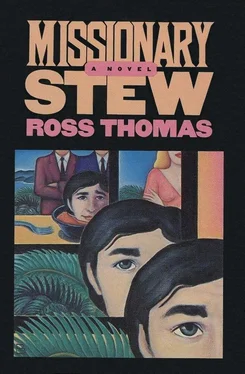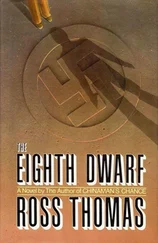Ross Thomas - Missionary Stew
Здесь есть возможность читать онлайн «Ross Thomas - Missionary Stew» весь текст электронной книги совершенно бесплатно (целиком полную версию без сокращений). В некоторых случаях можно слушать аудио, скачать через торрент в формате fb2 и присутствует краткое содержание. Город: New York, Год выпуска: 1983, ISBN: 1983, Издательство: Simon & Schuster, Жанр: Политический детектив, на английском языке. Описание произведения, (предисловие) а так же отзывы посетителей доступны на портале библиотеки ЛибКат.
- Название:Missionary Stew
- Автор:
- Издательство:Simon & Schuster
- Жанр:
- Год:1983
- Город:New York
- ISBN:978-0-671-49363-9
- Рейтинг книги:3 / 5. Голосов: 1
-
Избранное:Добавить в избранное
- Отзывы:
-
Ваша оценка:
- 60
- 1
- 2
- 3
- 4
- 5
Missionary Stew: краткое содержание, описание и аннотация
Предлагаем к чтению аннотацию, описание, краткое содержание или предисловие (зависит от того, что написал сам автор книги «Missionary Stew»). Если вы не нашли необходимую информацию о книге — напишите в комментариях, мы постараемся отыскать её.
Missionary Stew — читать онлайн бесплатно полную книгу (весь текст) целиком
Ниже представлен текст книги, разбитый по страницам. Система сохранения места последней прочитанной страницы, позволяет с удобством читать онлайн бесплатно книгу «Missionary Stew», без необходимости каждый раз заново искать на чём Вы остановились. Поставьте закладку, и сможете в любой момент перейти на страницу, на которой закончили чтение.
Интервал:
Закладка:
When Haere told his old man about the scholarship offer, the senior Haere had grinned and said, “No shit? You going to take it?”
“I don’t know,” Haere said.
“I don’t see why not.”
“I’ll think about it,” Haere said.
He reached his decision four weeks later when his father died from heart failure, seated in front of the radio listening to the detested Fulton Lewis, Jr. He also would have detested anyone’s calling it heart failure. “Heart failure kills everybody,” he sometimes told Haere, quoting one of his favorite copy-desk maxims. “But people die from heart attacks and heart seizures . Remember that.”
There was just enough money to bury him in a cemetery called Memorial Park. There were no services of any kind. The man from Sylacauga came up for the burial. He and Haere rode out to the cemetery together in the funeral-home car behind the hearse. No one from the paper came. Haere never did know why. Perhaps, he told himself, they just forgot.
There were two funeral-home attendants in the hearse. They, along with Haere and the man from Sylacauga, were to carry the casket, the cheapest available. At the last moment another car, a 1949 Hudson, pulled up and a man in his late forties got out. Wordlessly, he took hold of one of the handles and the five of them carried the casket to the open grave, into which it was lowered by a pair of gravediggers.
The man who came late turned to Haere. “I knew your father,” he said. “I admired him.” The man had a European accent of some kind. He didn’t say anything to the man from Sylacauga. Haere thought they might not have known each other, or it might have been that they did know each other but the man from Sylacauga simply ignored the stranger the way he ignored almost everyone.
“Would you like me to say a few words?” the man with the accent said.
“Sure,” Haere said. “If you want to.”
The man with the accent reached down, picked up a clod or two of red clay, and tossed the earth down on the casket.
“I knew this comrade,” said the man with the accent. “He was steadfast in the pursuit of justice all his life.”
The man from Sylacauga snorted in disgust, turned, and walked away. Draper Haere never saw either man again.
At virtually the same time that Draper Haere and his bleak thoughts were passing over the Grand Canyon on their way to Los Angeles, Morgan Citron was parking his 1969 Toyota sedan on the edge of the Pacific Coast Highway in Malibu.
From the highway, Craigie Grey’s apartment building didn’t look like six million dollars to Citron. Or five million. Or even four. It was only two stories in height and a bare fifty feet in width. Its architecture was mineshaft modern, and it was protected from Valley marauders by a seven-foot-high redwood fence that had a locked gate. Citron tried the key Craigie Grey had given him in the gate’s lock and was mildly surprised to find that it worked.
He went through the gate and into a small bricked patio. The bricks were used and divided into squared-off sections by old railroad ties. The patio also boasted a small green jungle of potted succulents and ferns illuminated by an outside floodlight that was mostly focused on the gate. From the light Citron could determine that the apartment building was constructed of redwood and shingle, which would burn quite merrily when one of the periodic fires swept down from the Santa Monica mountains and hopped the highway. If the place was really worth upward of four million dollars, Citron decided it must be because of the sound caused by the bang and crash of a heavy surf, which was so loud he could scarcely hear the highway traffic.
The grungy downstairs back apartment seemed to be Unit A. Using the same key he had used on the gate, Citron unlocked the apartment door and went in. He felt for the light switch, turned it on, and found himself in a one-room studio with a large single window overlooking the patio. The furnishings were sparse: a phone, a couch that he assumed pulled out into a bed, a round Formica-topped table with four chairs made out of bent iron and molded plastic, a shabby armchair that seemed to be of the reclining variety, and an old seventeen-inch black-and-white General Electric television set. The floor was covered with linoleum of the speckled-white-and-gold kind. It was almost worn through in the space in front of the Pullman kitchen. On the walls there was nothing. Not even a calendar.
It took Citron only two trips out to the Toyota to bring in everything he owned. As he was storing away the last of his three aluminum cooking pots, a woman’s voice said from the still-open door, “Can you fix a running toilet?”
Without turning, Citron said, “No.”
“What about a broken heart?”
“Not that either,” he said and turned.
His first impression was that although she was not very old, she was not nearly as young as she looked, which would have made her around nineteen, possibly twenty. Twenty-one at most. Somehow Citron knew she was at least thirty. It might have been the melancholy that peered out through her eyes, which were large and almost the color of woodsmoke. She had a beach dweller’s careless sun-streaked hair and an oval face with a rather interesting nose and a wide mouth set above a quite small chin that nevertheless looked defiant — or perhaps only stubborn. She was effortlessly pretty and with a little artful makeup might even have been beautiful in a vulnerable sort of way.
“I’m in Apartment E — in front,” she said. “My name’s Keats. Velveeta Keats.”
“Velveeta.”
“Sort of tips you off, doesn’t it? I mean, about my family. You’re wondering what kind of folks would name their youngest daughter Velveeta.”
“Am I?”
“Sure. The answer is: my kind of folks. The Keatses. The Florida Keatses. Or to pinpoint it: the Miami Keatses. My family was very big in the drug trade down there in the sixties and seventies.”
“But no more,” Citron said.
“They cashed out and went into T-bills. At least, that’s what they were in a year or so ago. They may be in municipal bonds by now. You ever notice how fast things move nowadays? The Keatses went from dirt-poor to hog-rich to banker-stuffy in one generation. But when I was born back in ’fifty-two they named me Velveeta because back then they thought it sounded pretty and tasted good.”
“They still like Velveeta?”
“The name?”
“The cheese.”
“They don’t like either one anymore. Mama calls me Vee now and they switched to Brie. Mama puts it on crackers with slivered almonds and sticks it in the microwave for a few seconds. If you’re wondering what I’m doing out here, I’m a remittance woman. Are you the new super?”
“Caretaker really.”
“What’s your name?”
Citron told her.
“That’s nice. French, isn’t it?”
“French.”
“Well, I’ve got this running toilet.”
“Jiggle it.”
“The handle?”
“Right.”
“I did that.”
“Try taking the top off. There’s a round ball in there that floats. Bend the rod that holds the ball. Bend it down. That sometimes works.”
“I did that, too.”
“Have you got a radio?”
“Sure.”
“Well, put the radio in the bathroom and turn it on. If you play it loudly enough, you won’t hear the toilet.”
She came farther into the apartment and looked around curiously. “Mind if I ask you a personal question?”
“Not at all.” He gestured toward the recliner, but Velveeta Keats chose instead one of the bent-iron-and-plastic chairs. Citron took a half gallon of Gallo red out of one of the two cardboard cartons he had carried in from the Toyota and poured wine into a pair of mismatched Kraft cheese glasses. He handed one of them to Velveeta Keats and then sat down opposite her at the table.
Читать дальшеИнтервал:
Закладка:
Похожие книги на «Missionary Stew»
Представляем Вашему вниманию похожие книги на «Missionary Stew» списком для выбора. Мы отобрали схожую по названию и смыслу литературу в надежде предоставить читателям больше вариантов отыскать новые, интересные, ещё непрочитанные произведения.
Обсуждение, отзывы о книге «Missionary Stew» и просто собственные мнения читателей. Оставьте ваши комментарии, напишите, что Вы думаете о произведении, его смысле или главных героях. Укажите что конкретно понравилось, а что нет, и почему Вы так считаете.












